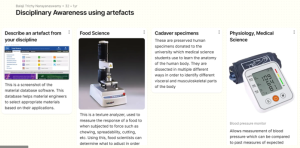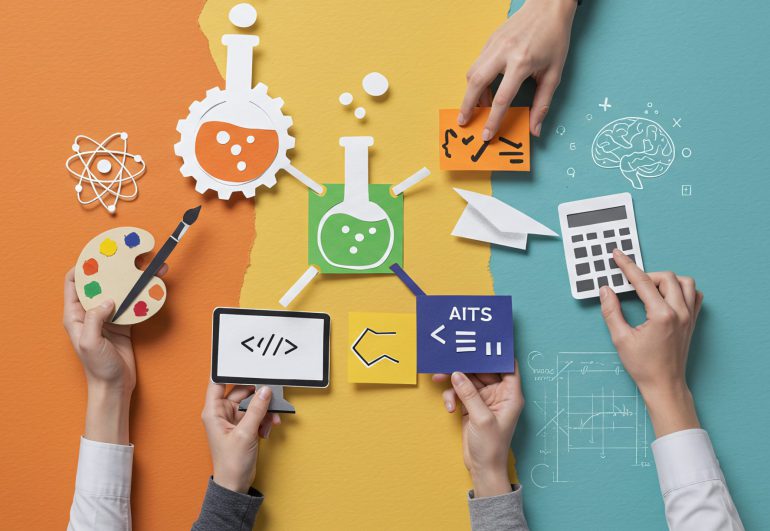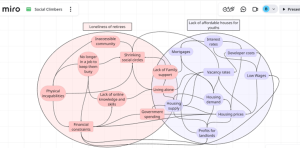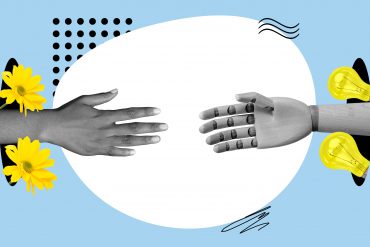I was inspired to write this post after repeatedly having to explain the nature of my teaching. My engineering training and industry experience often lead others to assume that I teach in engineering. Instead, I am an interdisciplinary lecturer delivering interdisciplinary education (IE) through ICPUs (Industry and Community Project Units) for third and fourth year UG students across the university. These projects, co-designed with external partners, bring together students from diverse disciplines to work on authentic projects driven by industry and community needs (e.g., Challenges in transitioning towards renewable energy in Australia). Therefore, my teaching practice extends beyond disciplinary boundaries, focussing on developing students’ ability to integrate knowledge from different disciplines and learn new methods outside their discipline for a holistic understanding of the problem (Lattuca et al. 2017a); interdisciplinary competency (IC). Interdisciplinary effectiveness is gaining significant traction as a core skill with 80% of organisations employing teams composed of varied professional backgrounds (Collins, C. G., & Jambrak, J. (2010), Sundstrom, 1999) in their work. Despite growing interest in interdisciplinary skills, facilitating ICPUs (and the development of interdisciplinary effectiveness more broadly) can be demanding and challenging. As it is one of our graduate qualities, I thought to share my experience of developing and delivering ICPUs, and a few tips that could be helpful for others teaching to this learning outcome in their units.
The challenges of interdisciplinary education
ICPUs are built on teamwork, disciplinary awareness, appreciating non-disciplinary perspectives, reflexivity and knowledge integration-key measures for interdisciplinary competence (Lattuca et al. 2012). Achieving all these dimensions in a single unit requires an agile teaching model with scaffolded learning activities tailored for students trained in distinct disciplinary paradigms. Without adequate preparation, students often face challenges in developing interdisciplinary competence.
- Teamwork challenges: International students with language barriers feel the need to stay within their cultural and ethnic groups. Often, they feel less confident contributing, limiting their use of cognitive skills needed for IE (Wilczewski, M. 2022). Difference in motivation levels influenced by workload, can also result in unequal participation and disengagement in interdisciplinary tasks.
- Disciplinary awareness: Teams may struggle to appreciate non-disciplinary perspectives and/or recognize disciplinary limitations. For instance, a mathematics student doesn’t appreciate groupwork due to their little experience with collaboration. Meanwhile, arts students may be less comfortable with data analysis (a disciplinary limitation). These gaps can create disciplinary egocentrism, reluctance to adopt new methods, and difficulties in integrating knowledge across fields (Newell and Green, 1982).
- Assessment struggles: Students accustomed to discipline-specific assessment styles often find interdisciplinary methods challenging (Hill et al. 2016). Reflective writing, a key tool for assessing interdisciplinary competence, is one example. While common in Arts and Social Sciences and Medicine and Health, it is less practiced in engineering and science and these students frequently encounter greater difficulty.
Key activities for developing interdisciplinary competence
ICPUs follow a structured teaching workflow of problem definition, research design, finalisation & presentation, delivered through project-based learning (PBL). PBL is a teaching strategy engaging students in developing higher order skills relevant to IC, i.e., problem-solving, decision-making and thinking skills (Thomas, J. W., 2000) through undertaking authentic real-world projects. The goal is to support development of the skill by embedding collaboration and engagement into every stage of the process. A critical factor for successful delivery is thoughtful group formation. Based on my experience, groups with an even distribution of academic performance, gender balance, and a mix of domestic and international students tend to encounter fewer difficulties. Once groups are formed, a sequence of targeted activities is administered to strengthen key dimensions of IE:
- Disciplinary grounding: I run a Padlet-based exercise on disciplinary grounding in Week 2, where students engage in describing the characteristics of their discipline including strengths and common stereotypes through an artefact that represents their field. This activity is light-hearted yet powerful, as it helps students appreciate disciplinary diversity while becoming aware of both strengths and limitations. Padlet allows students from different communication levels to participate and collaborate with no expectations for perfect academic English. This creates a welcoming and inclusive space for all students to participate, prepping them for interdisciplinary group work.
- Enhanced collaboration: From Weeks 3 to 6, collaboration is further enhanced using Miro boards. These online workflow tools support brainstorming and project design, allowing students to contribute synchronously or asynchronously (Allah 2023). This platform is particularly valuable for international students and those with English as an additional language as it reduces communication barriers and creates space for equal participation. For example, the in-built templates like mind maps, flowcharts, and diagrams, can help individuals and teams to share ideas and interpret complex information more clearly and effectively, replacing text-heavy & siloed communication. As an instructor, I can monitor activity on the boards, track participation, and identify students who may be disengaging. During those times, I can step in to investigate the challenge and offer support by co-working with them on a task.
- Interventions: Regular interventions are embedded to maintain group health (Gillies 2016). Mid-semester check-ins and SRES-based group surveys provide insight into both individual and team dynamics, highlighting challenges such as uncommunicative team members. For example, survey questions can act as team health checks by asking, “Do you feel supported by your team?” or “How motivated are you to contribute?” Early identification enables timely intervention, while group charters provide a framework for resolving issues independently. By recording meetings, documenting conflict resolutions, and reflecting on decisions made, teams strengthen their ability to find common ground (Lattuca et al., 2012), an essential skill for effective IC.
- Knowledge integration: To develop knowledge integration, I develop interdisciplinary role-play scenarios (for example, advocating solar technology for Westmead Hospital) where students role-play experts from different fields (e.g., environmental engineer, obstetrician) working together. Each role presents their priorities, followed by discussions on overlaps, conflicts and negotiations in achieving the intended objective (building solar technology in the Westmead maternity ward). Finally, reflections are recorded individually or in pairs to understand how knowledge integration or a cognitive advancement happened, and biases were overcome. This activity asks students to draw upon various sources of information (patient safety, carbon footprint reduction in hospitals, cost-benefit analysis) to develop a comprehensive understanding of the problem and in co-creating solutions. This is reflected in the final report proposing holistic recommendations to the partners considering multiple stakeholders’ perspectives.
Future work for interdisciplinary teaching
Building on current practice, my next focus will be on establishing group ownership at the beginning of semester to progress and improve team dynamics. Additionally, I intend to co-develop authentic assessments with industry partners to better simulate cross-sector collaboration contexts. Finally, I hope to collaborate with colleagues in developing learning activities for practicing IE principles and support institution-wide development of graduate interdisciplinary competencies – please get in touch if you would like to work together!
Find out more
Learn more about interdisciplinary education by enrolling in MPLF module 21: Supporting interdisciplinary learning






